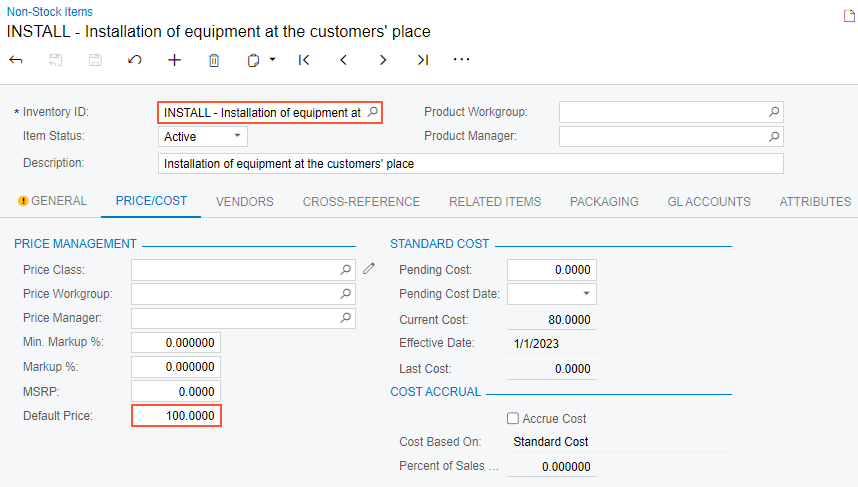Sales Prices: To Review Existing Prices
In this activity, you will learn how to view sales prices that have been defined in the system.
Story
Suppose that the SweetLife Fruits & Jams company has sales prices that were last updated in 2024. Acting as SweetLife’s accountant, you want to review what prices exist in the system for the ONLCOURSE online training course for a particular customer, for a customer price class, and as the base price of this item.
Also, you are interested in whether any promotional prices exist in the system for another training course, OFLCOURSE.
Because SweetLife is going to start installing juicers for customers in 2025, you want to make sure that the default price of the installation service (INSTALL) has been specified in the system.
Configuration Overview
In the U100 dataset, the following tasks have been performed to support this activity:
- On the Enable/Disable Features (CS100000) form, the Volume Pricing and Multiple Warehouses features have been enabled.
- On the Non-Stock Items (IN202000) form, the ONLCOURSE, OFLCOURSE, and INSTALL non-stock items have been created.
- On the Customer Price Classes (AR208000) form, the LOCAL customer price class has been created.
- On the Customers (AR303000) form, the COFFEESHOP customer has been created.
Process Overview
For a particular item, on the Sales Prices (AR202000) form, you will view the prices specified for a customer and for a customer price class. You will also view base prices and promotional prices for the item. You will view the default price of a particular non-stock item on the Non-Stock Items (IN202000) form.
System Preparation
To prepare the system, do the following:
- Launch the MYOB Acumatica website with the U100 dataset preloaded, and sign in to the system as an accountant by using the johnson username and the 123 password.
- In the info area, in the upper-right corner of the top pane of the MYOB Acumatica screen, make sure that the business date in your system is set to 1/30/2025. If a different date is displayed, click the Business Date menu button and select 1/30/2025. For simplicity, in this lesson, you will create and process all documents in the system on this business date.
- On the Company and Branch Selection menu, also on the top pane of the MYOB Acumatica screen, make sure that the SweetLife Head Office and Wholesale Center branch is selected. If it is not selected, click the Company and Branch Selection menu button to view the list of branches that you have access to, and then click SweetLife Head Office and Wholesale Center.
Step 1: Viewing Sales Prices for a Particular Customer
To view the sales prices defined for a particular customer, COFFEESHOP, do the following:
- Open the Sales Prices (AR202000) form.
- In the Price Type box of the Selection area, select Customer.
- In the Price Code box, select COFFEESHOP.
- In the form table, review the price of your company's online training course
(ONLCOURSE) for the COFFEESHOP customer ($13), as shown in the
following screenshot.
Figure 1. The price specified for the COFFESHOP customer 
Step 2: Viewing Sales Prices for a Customer Price Class
To view the sales prices defined for local customers (that is, customers assigned to the LOCAL customer price class), do the following:
- While you are still on the Sales Prices (AR202000) form, in the Price Type box of the Selection area, select Customer Price Class.
- In the Price Code box, select LOCAL.
- In the table, review the price of your company's online course
(ONLCOURSE) for local customers ($14.50), as shown in the following
screenshot.
Figure 2. The price specified for the LOCAL customer price class 
Step 3: Viewing an Item's Base Price
To view the base price of a particular item, ONLCOURSE, do the following:
- While you are still on the Sales Prices (AR202000) form, in the Price Type box of the Selection area, select Base.
- In the Inventory ID box, select ONLCOURSE.
- In the table, review the base price of the ONLCOURSE non-stock item in
the system ($15) as shown in the following screenshot.
Figure 3. The base price of the ONLCOURSE non-stock item 
Step 4: Viewing an Item's Promotional Prices
To view the promotional prices in the system as of 1/1/2025, do the following:
- While you are still on the Sales Prices (AR202000) form, clear the Inventory ID box of the Selection area.
- In the Price Type box, select All Prices.
- In the Effective As Of box, select 1/1/2025.
- In the table, click the Promotion column, and in the dialog box that opens, select True and click OK.
- In the table, review the promotional price for the OFLCOURSE item ($40),
and notice its effective dates (12/17/2024 - 1/17/2025).
Figure 4. The promotional price of the OFLCOURSE non-stock item 
Step 5: Viewing the Default Price of an Item
To view the price set up as the default price of the INSTALL non-stock item, do the following:
- Open the Non-Stock Items (IN202000) form.
- In the Inventory ID box, select INSTALL.
- On the Price/Cost tab, which is shown in the following
screenshot, in the Default Price box, review the default
price of the installation services ($100).
Figure 5. The default price of the INSTALL non-stock item 
